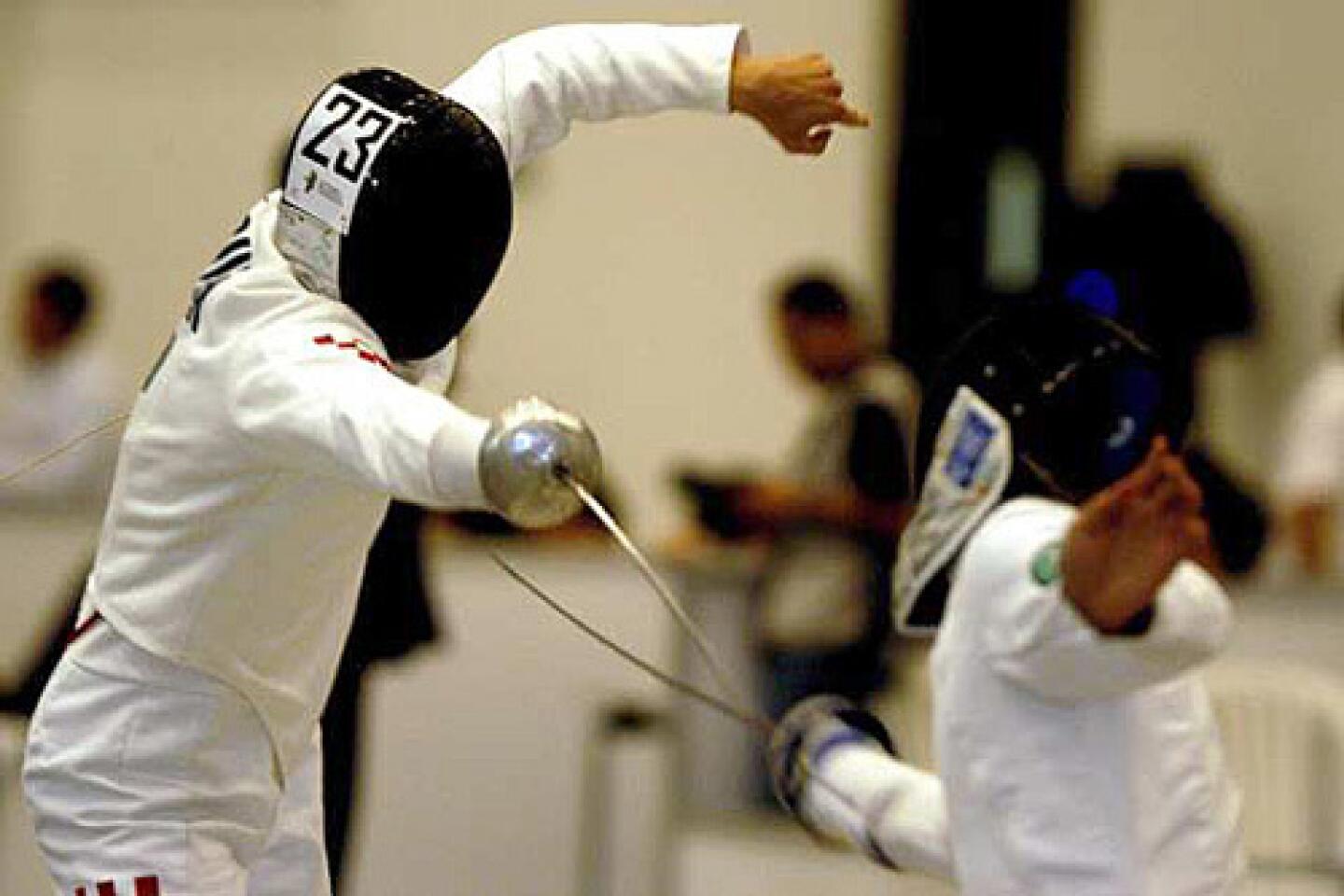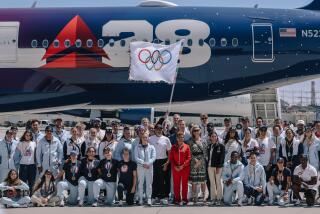Athletes work to ensure their gear arrives safely
- Share via
Swimmers who will compete in the Beijing Olympics can pack light.
All they have to bring is a suit, goggles and a cap. For the synchronized swimmers, add hair gel and glitter. Throw in a robe or warmup suit and they’re good to go.
Most track and field athletes can get by with minimal baggage too. Shirt, shorts, shoes, maybe a jacket and pants, and they’re ready to toe the line.
Same for gymnasts, who need to tote only leotards or pants and shirts. The uneven bars, balance beam, parallel bars and pommel horse will be provided on site.
But for the real horses, who must spend a week in quarantine, traveling isn’t so simple.
The process also can be complicated for pole vaulters, who must check their poles, pay extra baggage fees and hope the equipment they love will show up at the other end. That doesn’t always happen, especially on trips to out-of-the-way places.
“When you start switching airlines, that’s when you start losing poles,” said American champion Jenn Stuczynski, who has lost poles but later got them back.
Even the shortest trip requires a mountain of red tape and careful preparation for athletes in shooting sports. Like fencers, shooters can’t carry their weapons on board commercial airline flights and must pack them and check them as luggage.
Kim Rhode of El Monte, who won two gold medals and a bronze in double trap shooting and will compete in skeet shooting at Beijing, goes through a tedious routine each time she travels.
She must unload her gun, place it in a packing case, sign a declaration at the check-in counter that it’s unloaded, lock it and bring it to Transportation Security Administration agents. They may open the case before it’s scanned and loaded into the plane’s cargo hold.
“When we get to another country, we pick it up on the other end and we once again have to go through customs and declare it,” Rhode said. “And of course there’s tons and tons of paperwork we have to fill out prior to doing that. Before we get there, even.
“Basically they check all the serial numbers on the gun. So they have to open it up again, they verify all the serial numbers are correct with all the paperwork that we filled out. They’ll usually either stamp it, give us a little piece of paper with a stamp on it or a signature or whatever.”
From there, she said, the shooters will take them to a police station or the competition shooting range, where the guns are locked up. Sometimes, police officers will take the guns directly to the shooting facility.
Fencer Jason Rogers of Los Angeles reluctantly checks his saber before plane trips.
“The stuff that we have is actually not really all that scary-looking,” he said. “The practice weapons, they’re not sharp. They don’t really resemble actual swords with which you impale somebody. So that’s not really an issue.”
The issue is losing everything else. The sabers aren’t particular to a user and can be borrowed, but that’s not true of all his gear.
“Literally, I’m carrying every article that’s truly essential,” he said, “like my shoes, my fencing pants, my fencing jacket, the jacket that we wear on top of that. Anything that’s going to be difficult to borrow, I carry on. Then you just hope at least a few of our bags show up.”
Stuczynski and Rhode have contingency plans in case their bags go astray.
“I have poles at the factory ready to go in case they have to send them out,” Stuczynski said. “And I also have a bag that’s packed right now and on the pad at home where [her coach’s] brother is on call in case he has to ship them somewhere, and he has all the information.
“I’m not going to jump as high because they’re shorter poles, but at least I know them.”
Rhode said shooters spend many years and many dollars customizing their guns, making the loss of one “devastating.” Like many shooters, she has broken in a backup before the Games.
“As I’ve gotten closer and closer to the Olympics, with the possibility of losing a gun in transit, I’m only traveling with one gun,” she said. “I’m leaving one at home in case one disappears.”
That’s one fear U.S. rowers and sailors won’t have to face.
Rowers’ boats were shipped to China via a 45-foot container that left the U.S. on May 17 and arrived in Beijing in early July.
Most sailors’ boats were shipped in containers after their rigs were taken down to make the boats fit. A spokeswoman for USA Sailing said some teams sent their boats by air freight. All had to be mindful of shipping early to allow for travel and clearing customs, which can take more than a week.
Getting horses to the Games takes extensive planning. Because of China’s quarantine laws and a lack of suitable sites, the Olympic equestrian events won’t be held in Beijing. They will take place in Hong Kong, at the lavish Jockey Club.
“It’s like Disneyland for horses,” said Jim Wolf, chef de mission for the U.S. Equestrian team.
“It’s got wonderful veterinary facilities, beautiful stabling, and the trucks that they’re going to use to transport the horses are the best I’ve seen anywhere.”
There’s a precedent for holding equestrian events separately: strict quarantine laws led organizers to stage the 1956 Olympic equestrian competition in Stockholm, Sweden, five months before the Melbourne Games.
Wolf said the U.S. Equestrian Federation sent heavy equipment by sea to Hong Kong and that it arrived July 15. Horses were flown first to Europe to wait out a week’s quarantine, with the last ones departing July 16. Eventing horses were sent to England and show jumpers and dressage horses to Germany before making the last leg of the journey.
Horses travel on what are called combi-flights, half passenger and half freight.
“The horses are going first class and our people are going coach,” Wolf said. “The horses have the best seat in the house on the cargo deck. . . . What we’ve done for the horses probably exceeds what anyone else has done for the human athlete.”
RELATED STORY Iraq in: IOC reverses itself and will allow it to take part in Games after assurances. A7ON LATIMES.COM U.S. gymnast Morgan Hamm is cleared to compete after issues over cortisone shot.
More to Read
Sign up for The Wild
We’ll help you find the best places to hike, bike and run, as well as the perfect silent spots for meditation and yoga.
You may occasionally receive promotional content from the Los Angeles Times.












